- Internal Resistance 1 to 9
- Hybrid/EV Battery Block 1 to 9 Voltage*1
- Hybrid/EV Battery SOC
| Last Modified: 05-13-2024 | 6.11:8.1.0 | Doc ID: RM100000001GCN4 |
| Model Year Start: 2020 | Model: Corolla | Prod Date Range: [01/2019 - 09/2022] |
| Title: HYBRID / BATTERY CONTROL: HYBRID CONTROL SYSTEM (for NICKEL METAL HYDRIDE BATTERY): P1A8000,P1AD01B; Hybrid/EV Battery Stack 1 Delta SOC High; 2020 - 2022 MY Corolla Corolla HV [01/2019 - 09/2022] | ||
|
DTC |
P1A8000 |
Hybrid/EV Battery Stack 1 Delta SOC High |
|
DTC |
P1AD01B |
Hybrid/EV Battery Block Circuit Resistance Above Threshold |
DESCRIPTION
The battery voltage sensor and the hybrid vehicle control ECU calculate the SOC (state of charge) of the HV battery through the accumulated amperage in the HV battery. The battery voltage sensor sends the condition of the HV battery to the hybrid vehicle control ECU. Then the hybrid vehicle control ECU calculates the SOC based on the information and controls the charging and discharging of the HV battery based to the driving condition.
Based on the HV battery voltage and current, the battery voltage sensor calculates the resistance and judges if the HV battery has deteriorated.
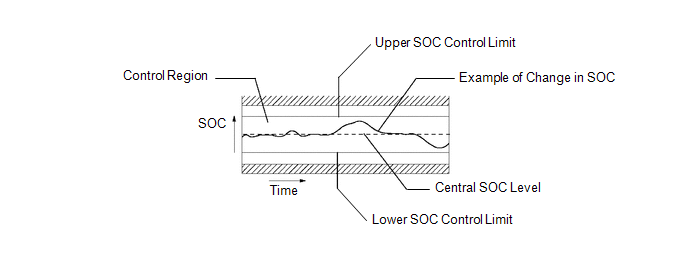
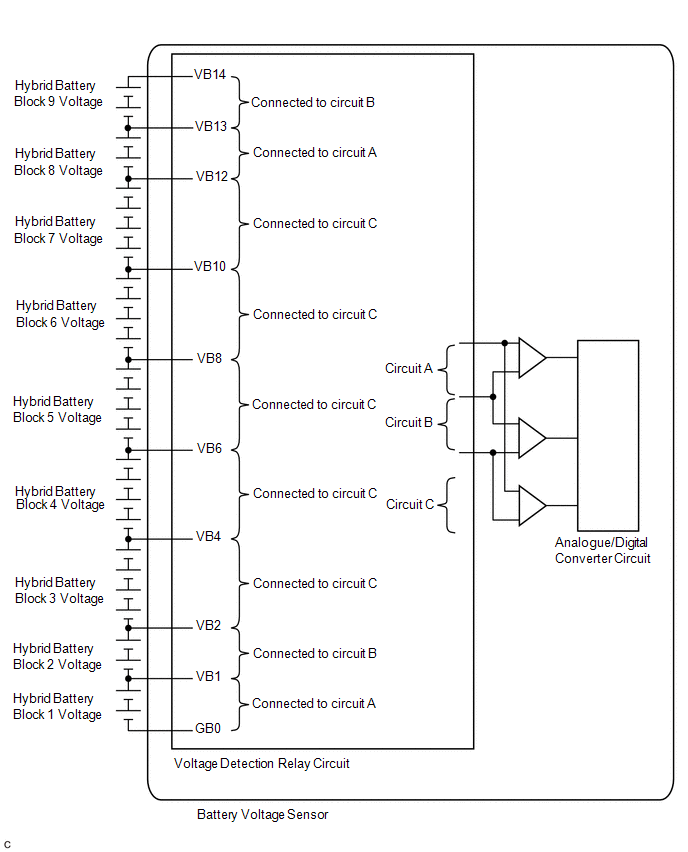
|
DTC No. |
Detection Item |
DTC Detection Condition |
Trouble Area |
MIL |
Warning Indicate |
|---|---|---|---|---|---|
|
P1A8000 |
Hybrid/EV Battery Stack 1 Delta SOC High |
Difference in capacity between each battery block is larger than standard. (2 trip detection logic) |
|
Comes on |
Master Warning: Comes on |
|
P1AD01B |
Hybrid/EV Battery Block Circuit Resistance Above Threshold |
Resistance of an HV battery block exceeds the specified value. (1 trip detection logic) |
|
Comes on |
Master Warning: Comes on |
Related Data List
|
DTC No. |
Data List |
|---|---|
|
P1A8000 |
|
|
P1AD01B |
HINT:
- *1: Under normal conditions, the values of Hybrid/EV Battery Block 1, 2, 8 and 9 Voltage will be approximately 16 V and Hybrid/EV Battery Block 3, 4, 5, 6 and 7 Voltage will be approximately 32 V.
- If there is a short or open in a battery block voltage detection line, the value of Hybrid/EV Battery Block Voltage for the corresponding battery block will be lower than 8 V.
The following items can be helpful when performing repairs:
Data List
- Ready Signal
- Vehicle Speed
- Accelerator Position
- Shift Position
- Engine Speed
- Hybrid/EV Battery Voltage
- Hybrid/EV Battery Current
- BATT Voltage
- Hybrid/EV Battery SOC of Immediately after IG ON
- Hybrid/EV Battery Maximum SOC
- Hybrid/EV Battery Minimum SOC
- Total Distance Traveled
- Distance from DTC Cleared
- Engine Run Time
Vehicle Control History Data
- Hybrid/EV Battery Voltage Low
HINT:
- This DTC can be stored after clearing DTCs and driving the vehicle for approximately 10 minutes. (As 2 trip detection logic is also used, check for DTCs including pending DTCs.)
- This DTC may not be stored if the vehicle is stopped or being driven at a steady speed.
- When the internal resistance of the HV battery increases, hybrid battery block voltage may drop.
- If resistance is abnormal, the voltage of the battery blocks indicated by the DTCs are likely to decrease more than others during acceleration (discharging), and increase more during deceleration (charging).
-
In order to ensure HV battery performance, appropriate cooling performance must be maintained. Perform the following items as necessary. If cooling performance has decreased and "Maintenance Required for Traction Battery Cooling Parts See Owner's Manual" is displayed on the multi-information display, make sure to perform the following items:
- Make sure the air intake port is not blocked.
- Make sure there are no gaps between the connecting parts of the ducts.
-
Clean the No. 1 HV battery intake filter.
- Clear the DTCs to reset the learning values even if no DTCs are stored.
MONITOR DESCRIPTION
If there is an abnormal internal resistance or SOC in the battery blocks, the battery voltage sensor determines that a malfunction has occurred. When the malfunction detection condition is satisfied, the hybrid vehicle control ECU will illuminate the MIL and store a DTC.
MONITOR STRATEGY
|
Related DTCs |
P1A80 (INF P1A8000), P1AD0 (INF P1AD01B): Battery cell malfunction |
|
Required sensors/components |
Main: Battery voltage sensor, battery current sensor Sub: Battery temperature sensor |
|
Frequency of operation |
Continuous |
|
Duration |
TMC's intellectual property |
|
MIL operation |
P1A80 (INF P1A8000): 2 driving cycles P1AD0 (INF P1AD01B): 1 driving cycle |
|
Sequence of operation |
None |
TYPICAL ENABLING CONDITIONS
|
The monitor will run whenever the following DTCs are not stored |
TMC's intellectual property |
|
Other conditions belong to TMC's intellectual property |
- |
TYPICAL MALFUNCTION THRESHOLDS
|
TMC's intellectual property |
- |
COMPONENT OPERATING RANGE
|
Battery voltage sensor |
DTC P1A80 (INF P1A8000) is not detected DTC P1AD0 (INF P1AD01B) is not detected |
CONFIRMATION DRIVING PATTERN
HINT:
- Connect the Techstream to the DLC3.
- Turn the power switch on (IG) and turn the Techstream on.
- Clear the DTCs (even if no DTCs are stored, perform the clear DTC procedure).
- Turn the power switch off and wait for 2 minutes or more.
- Turn the power switch on (IG) and turn the Techstream on.
-
Drive the vehicle on urban roads at a speed of 40 km/h (25 mph) or more for a total of at least 10 minutes. (It is not necessary to maintain the vehicle speed at 40 km/h (25 mph) throughout the road test.)[*1]
HINT:
- This DTC may not be stored if the vehicle is stopped or being driven at a steady speed.
-
[*1]: Normal judgment procedure.
The normal judgment procedure is used to complete DTC judgment and also used when clearing permanent DTCs.
- Enter the following menus: Powertrain / Hybrid Control / Utility / All Readiness.
-
Check the DTC judgment result.
HINT:
- If the judgment result shows NORMAL, the system is normal.
- If the judgment result shows ABNORMAL, the system has a malfunction.
- If the judgment result shows INCOMPLETE or N/A, perform the normal judgment procedure again.
CAUTION / NOTICE / HINT
CAUTION:
-
Before the following operations are conducted, take precautions to prevent electric shock by turning the power switch off, wearing insulated gloves, and removing the service plug grip from HV battery.
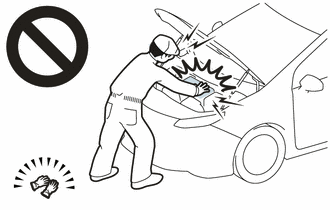
- Inspecting the high-voltage system
- Disconnecting the low voltage connector of the inverter with converter assembly
- Disconnecting the low voltage connector of the HV battery
-
To prevent electric shock, make sure to remove the service plug grip to cut off the high voltage circuit before servicing the vehicle.
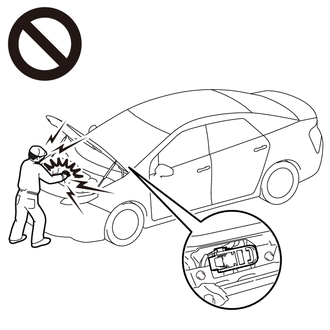
-
After removing the service plug grip from the HV battery, put it in your pocket to prevent other technicians from accidentally reconnecting it while you are working on the high-voltage system.
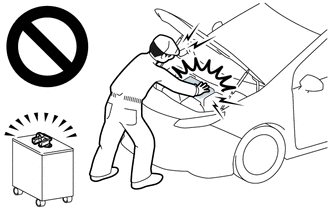
-
After removing the service plug grip, wait for at least 10 minutes before touching any of the high-voltage connectors or terminals. After waiting for 10 minutes, check the voltage at the terminals in the inspection point in the inverter with converter assembly. The voltage should be 0 V before beginning work.
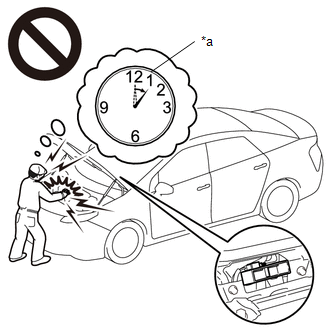
*a
Without waiting for 10 minutes
HINT:
Waiting for at least 10 minutes is required to discharge the high-voltage capacitor inside the inverter with converter assembly.
-
Make sure to insulate the high-voltage connectors and terminals of the HV battery with insulating tape after removing it.
If the HV battery stored without insulating the connectors and terminals, electric shock or fire may result.
-
When disposing of an HV battery, make sure to return it through an authorized collection agent who is capable of handling it safely. If the HV battery is returned via the manufacturer specified route, it will be returned properly and in a safe manner by an authorized collection agent.
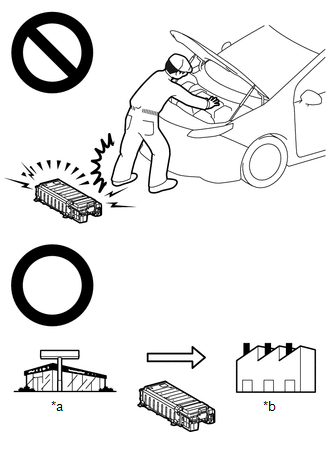
*a
Dealer
*b
Battery Collection Agent
- Accidents such as electric shock may result if the HV battery is disposed of improperly or abandoned. Therefore, make sure to return all HV batteries through an authorized collection agent.
-
After removing the HV battery, keep it away from water. Exposure to water may cause the HV battery to produce heat, resulting in a fire.
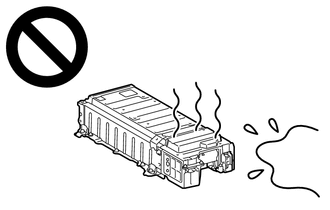
NOTICE:
After turning the power switch off, waiting time may be required before disconnecting the cable from the negative (-) auxiliary battery terminal. Therefore, make sure to read the disconnecting the cable from the negative (-) auxiliary battery terminal notices before proceeding with work.
PROCEDURE
|
1. |
CHECK DTC OUTPUT (HYBRID CONTROL) |
(a) Connect the Techstream to the DLC3.
(b) Turn the power switch on (IG).
(c) Enter the following menus: Powertrain / Hybrid Control / Trouble Codes.
(d) Check and record any HV system DTCs and freeze frame data.
Powertrain > Hybrid Control > Trouble Codes
|
Result |
Proceed to |
|---|---|
|
P0AFC00, P0AFC96, P308A12 or P0AFC62 is output |
A |
|
Other than above (w/o Canister Pump Module) |
B |
|
Other than above (w/ Canister Pump Module) |
C |
(e) Turn the power switch off.
| A |

|
| B |

|
|
|
2. |
CHECK FREEZE FRAME DATA |
(a) Connect the Techstream to the DLC3.
(b) Turn the power switch on (IG).
(c) Read the value of freeze frame data item "Number of Hybrid/EV Battery Current Sensor Characteristics Determination" for DTC P1A8000 or P1AD01B.
Powertrain > Hybrid Control
|
Tester Display |
|---|
|
Number of Hybrid/EV Battery Current Sensor Characteristics Determination |
|
Result |
Proceed to |
|---|---|
|
0 to 99 |
A |
|
Other than above |
B |
(d) Turn the power switch off.
| B |

|
|
|
3. |
CHECK TOTAL DISTANCE DRIVEN |
(a) Read the odometer to check the total distance the vehicle has been driven.
|
Result |
Proceed to |
|
|---|---|---|
|
Total distance driven is less than 200000 km (124280 mile) |
A |
|
|
Total distance driven is 200000 km (124280 mile) or more |
Current total distance driven - total distance driven when hybrid battery terminal block replaced = less than 200000 km (124280 mile) *1 |
|
|
Other than above |
B |
|
HINT:
*1: If the hybrid battery terminal block has been replaced, use the total distance driven since it was replaced.
| A |

|
|
|
4. |
REPLACE HV BATTERY |
| NEXT |

|
|
|
|
![2020 - 2022 MY Corolla Corolla HV [01/2019 - 09/2022]; HYBRID / BATTERY CONTROL: HYBRID CONTROL SYSTEM (for NICKEL METAL HYDRIDE BATTERY): UTILITY](/t3Portal/stylegraphics/info.gif)
